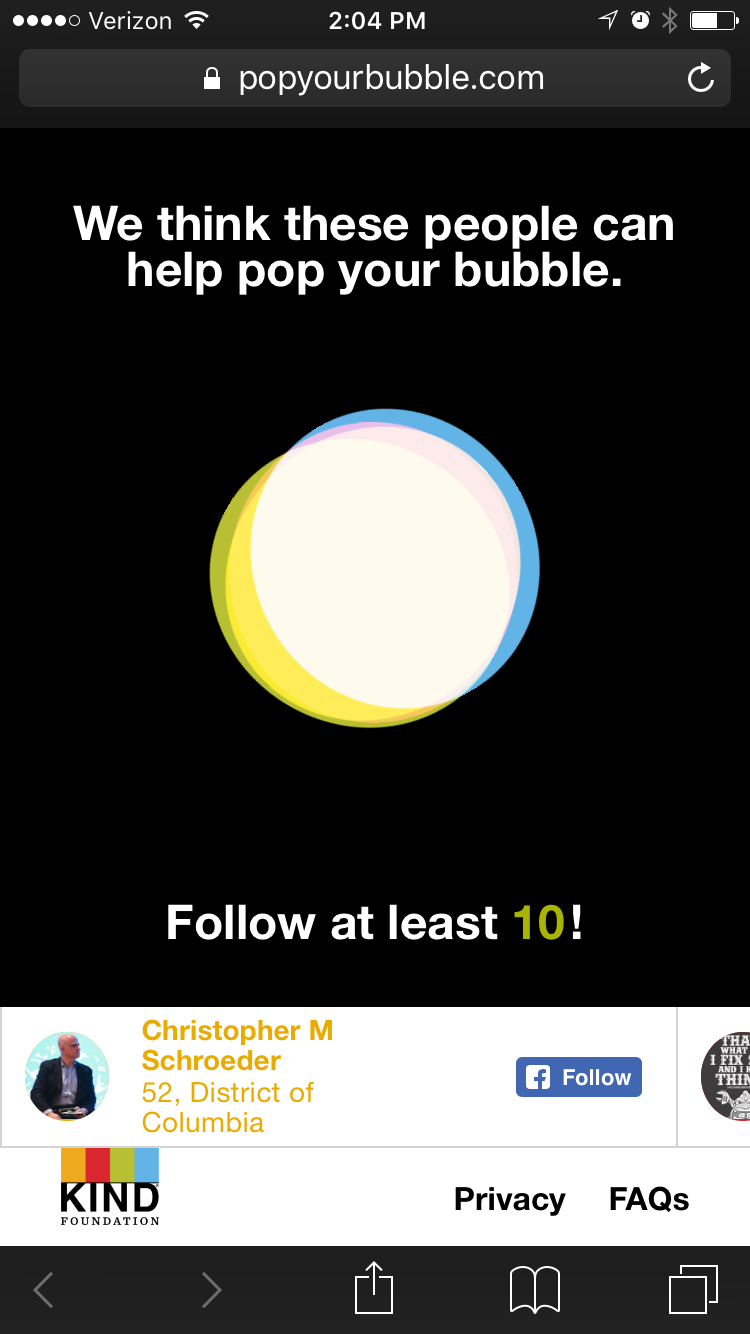Last chance to save on Digiday Publishing Summit passes is February 9
The modern American reality is that of a political and social filter bubble. Maybe a granola bar can change things.
On Tuesday, Kind Snacks’ non-profit wing will launch “Pop Your Bubble,” a Facebook plugin that connects Facebook users with people vastly different from them in order to force them to embrace different points of view. Consider it a Tinder swipe, except that instead of trying to find something in common, it’s a mismatch designed to steer you toward debate and discussion.
This is how it works: Users can visit the microsite popyourbubble.com and link it with their Facebook profiles. A custom algorithm will then scrub through their profiles — deviating from traditional algorithms that suggest familiar content based on past activity and interests — pulling up people’s profiles least similar to theirs.
Specifically, it matches users with those who differ across key demographics, such as geographic location and age, and have historically liked and shared dissimilar content. Users are then prompted to follow at least 10 new people whose posts will subsequently appear in their newsfeeds. Those who want to go a step further can add their profile and allow future users to follow them. The tool was developed for Kind by Edible, a food and beverage specialty agency within PR agency Edelman.

“The hope is that we’re able to change a few people’s perspectives or at least help them find some kind of common ground or space where they can listen to one another,” said Elle Lanning, chief of staff and svp of corporate development at Kind, and also an adviser to The Kind Foundation, the brand’s nonprofit arm. “With the heightened level of polarization that has been driven by this last political cycle, we want to help people listen to understand rather than just listening to respond.”
“It was eye-opening because I was confident that I was regularly talking to people whose points of view were different from mine,” said Lawrence Alexander, one of the 10 people commissioned by the brand to test out the tool. “But it stopped me dead in my tracks and made me realize I wasn’t engaging in as much dialogue as I thought I was.”
Kind’s tool is the latest attempt by a brand to pay lip-service to a social cause and get some good press along the way. But as the recent Pepsi-Kendal Jenner ad debacle shows, things can go horribly south when consumers pick up on brands’ dubious marketing ploys — and making the world a better place has increasingly become one of them. But Kind says that helping build bridges among people has always been in its DNA.
“If you’re trying to be something you’re not, the audiences can detect that and punish you,” said Daniel Lubetzky, founder and CEO of Kind and president of the Kind Foundation. “I am not of the opinion that every brand has to have an opinion and jump on the bandwagon; it only works when it is real, authentic and consistent.”
While the algorithm does not directly suggest matches based on a user’s political leanings, politics will inevitably be a factor due to the emphasis it places on past likes and shares.
“We wanted to challenge people’s confirmation biases,” said Lubetzky. “People have become too used to seeing everything from the same lens, especially on social media.”
More in Marketing

GLP-1 draws pharma advertisers to double down on the Super Bowl
Could this be the last year Novo Nordisk, Boehringer Ingelheim, Hims & Hers, Novartis, Ro, and Lilly all run spots during the Big Game?

How food and beverage giants like Ritz and Diageo are showing up for the Super Bowl this year
Food and beverage executives say a Super Bowl campaign sets the tone for the year.

Programmatic is drawing more brands to this year’s Winter Olympics
Widening programmatic access to streaming coverage of the Milan-Cortina Games is enabling smaller advertisers to get their feet in the door.








